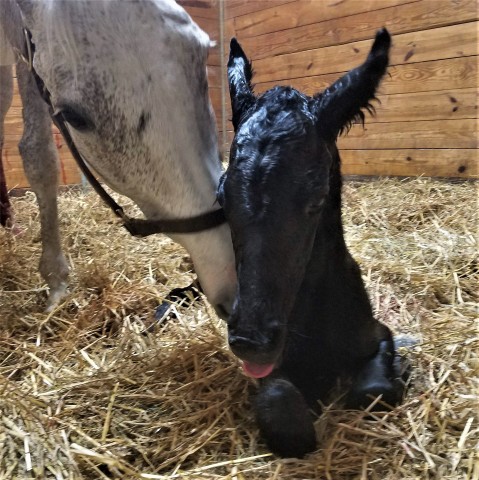Managing Equine Pregnancy

It’s the time of year when we start to see newborn foals….the equine foaling season usually lasts from January 1 to late June. I thought this might be a good time to outline some guidelines for owners with expectant mares.
Vaccination Protection is KEY! — Pregnant mares should get Rhinopenumonitis Virus vaccination at 5,7, and 9 months of gestation to prevent abortion from this virus. Additionally all mares should have fully updated vaccines some time during their 9th or 10th month of gestation. Boosting their immunity at this time not only protects them, but these invaluable antibodies get passed on to the foal in the mare’s colostrum (the first milk she produces after the baby is born).
Grumpy/Uncomfortable Mares — As happens with any female in late gestation, things can get a bit uncomfortable. It is normal to see mares get a bit stocked up in the lower limbs or even have a plaque of edema on their belly. Regular turnout and low level exercise can help. Additionally some mares may act a bit colicky as the large fetus shifts position within the uterus. Some times just a short walk and a dose of pain meds can help this, but we always recommend to CALL US if you are concerned that your late term mare is acting uncomfortable and we will help you determine if she needs to be seen.
Delivery Time - Horses experience very quick labor and delivery. In most cases the time from the water breaking until the foal is on the ground should be less than 30 minutes. If you feel things are taking longer than they should be or if your mare seems very distressed, please call us immediately for help.
The Rule of 1-2-3 — After the foal is on the ground it is good to give the mare and foal a little space and time to get to know eachother. Try to avoid entering the stall unless there is a problem. It is normal for the mare to lay down and rest for a little while after delivery. However, its good to follow this guideline. The foal (and mare as well) should be standing on its own by 1 hour after delivery. The foal should be nursing on its own by 2 hours after delivery. The mare should pass the placenta by 3 hours after delivery. If these things do not happen, please call us for help.
Foal Check — If everything goes smoothly, there is no need for a veterinarian to see the foal immediately. But it is important we see the mare and foal between 12-18 hours after the foal is born. At this exam we will check over both baby and mom to make sure everyone is doing well. We will examine the placenta (KEEP that placenta in a garbage bag) to make sure it is all present. A retained piece of placenta can make a mare very sick. Finally, we will run a blood test on the foal to ensure it has received enough of that colostrum (truly liquid gold!).
Here’s hoping this foaling season goes smoothly and we end up with lots of healthy mares and foals.